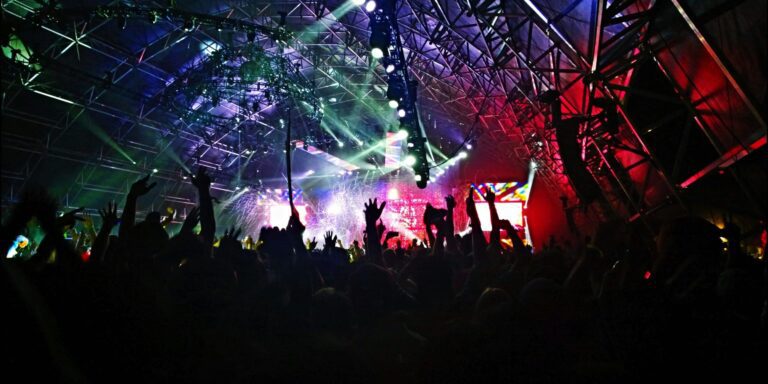The music festival scene in 2024 has evolved into something far beyond the small, regional gatherings of the past. Music festivals today are massive global phenomena, attracting people from all corners of the world. What once began as intimate, genre-specific events have now grown into multifaceted celebrations of art, culture, and technology. The festival experience has undergone significant change, driven by the rise of global audiences, advancements in technology, and increasing demand for sustainability and inclusivity. But what exactly are the trends shaping the future of music festivals, and where do they go from here?
The Globalization of Festivals
Music festivals have transformed from small, local gatherings to massive international events. Once confined to specific regions or music genres, today’s festivals like Coachella, Glastonbury, and Tomorrowland attract attendees from across the globe. These festivals serve as hubs for a diverse range of musical genres, cultures, and backgrounds. The growing global nature of festivals is largely thanks to the power of social media, which allows festival organizers to reach audiences worldwide, making these events accessible even to those who may never attend in person.
For example, Coachella in California is not just a local celebration of music but a global event livestreamed for millions of viewers. Fans from Asia, Europe, and beyond can enjoy the performances as if they were right there in the crowd. This virtual access is helping bridge cultural gaps and creating global communities built around shared musical interests.
Tech-Driven Experiences
Technology has revolutionized how we experience live music. No longer is a music festival simply about the music—it’s about immersing yourself in an entire experience. In 2024, festivals are incorporating high-tech elements that make the experience interactive and engaging in new ways. Virtual reality concerts, interactive stages, and augmented reality installations are becoming staples in many large festivals.
At Tomorrowland, for example, the integration of virtual reality allows attendees to experience live performances from different perspectives, such as standing next to their favorite DJ or getting an aerial view of the entire stage. This level of immersion was once unimaginable but is now an integral part of the festival experience.
Artists, too, are leveraging technology to engage more directly with their fans. Live streaming, interactive Q&A sessions, and digital meet-and-greets have made it easier for fans to connect with their favorite musicians, fostering deeper relationships and a sense of community. The technology is not just enhancing the live experience; it’s reshaping how artists and fans interact on a global scale.
Sustainability and Social Responsibility
As environmental and social issues take center stage globally, music festivals have increasingly become a platform for activism. In 2024, sustainability is a key consideration for both festival organizers and attendees. Festivals like Glastonbury and Electric Forest are taking significant steps to reduce their environmental impact by encouraging recycling, cutting down on single-use plastics, and promoting sustainable transportation options.
This movement is not just about the festival itself but also about raising awareness on environmental issues. Artists are using their performances to advocate for sustainability, while fans are becoming more conscious of their role in reducing waste and energy consumption during the event.
In addition, there is growing pressure for festivals to embrace social responsibility. Inclusivity, accessibility, and mental health support have become crucial elements in festival planning. Many festivals now offer designated quiet zones for attendees who may feel overwhelmed, as well as wellness spaces for those seeking respite. There’s also a concerted effort to feature a more diverse lineup of artists, making sure that festivals reflect the broad spectrum of musical talent across different genres and cultures.
Virtual Festivals and Digital Engagement
The COVID-19 pandemic pushed many festivals to adapt and innovate. While in-person events were restricted, virtual festivals took off, offering a new way for fans to experience live performances. Today, virtual festivals are here to stay, offering an alternative way to experience music on a global scale.
Tomorrowland’s 2020 virtual edition, “Around the World,” was a massive success, attracting millions of viewers from across the globe. Virtual festivals have proven to be not only a temporary solution but a viable long-term option for fans who may not be able to attend in person due to financial or geographic constraints. This means that festivals no longer have to be restricted by location—anyone, anywhere can participate, regardless of where they are.
Beyond the virtual experience, digital platforms are making it easier for fans to engage with music festivals even after the event. For instance, many festivals now offer recorded sets and behind-the-scenes content that fans can enjoy months after the event. This extended digital engagement enhances the festival experience and keeps the spirit of the event alive long after the final performance.
The Future of Festivals: What’s Next?
Looking ahead, the future of music festivals is set to be even more inclusive and innovative. The festival landscape will continue to be shaped by technological advances, social movements, and a growing awareness of environmental and mental health issues. Virtual festivals will likely grow in importance, allowing fans to access events they would otherwise miss. Sustainability and social responsibility will remain key focuses, with more festivals adopting green practices and prioritizing inclusivity for all attendees, regardless of their background, physical ability, or mental health needs.
In 2024 and beyond, music festivals will continue to be more than just places to hear music—they’ll be immersive experiences that celebrate culture, community, and the power of music to bring people together from all corners of the world.


